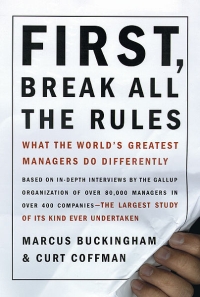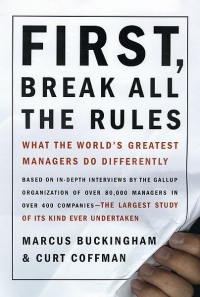— 2 minutes reading
1) Fix an employee’s weakness so that they become more well-rounded
Or
2) Focus on an employee’s strength so that they become more specialized
Which one would you choose?
The Gallup Organization interviewed over 80,000 managers in 2,500 business units and found that great managers who out-perform their peers chose the second answer.
The answer makes a lot of sense if you think about it. If your business has a superstar in each of marketing, finance, operations, service, etc., your whole team will fit nicely together and be able to produce some great results. On the other hand, if you just have a bunch of average staff who each can do a bit of marketing, finance, operation, etc., then you’ll only get average results.
On a more individual level, the research argues that individuals who don’t have an inherited talent for a specific area (ie. their weakness) can never achieve excellence in that area. Fixing it will only push it to a more acceptable level. Rather, if you spend the same amount of time developing their potential and nurturing their strength, the outcome will be far more impressive.
More simply, you cannot expect Mozart to become Einstein by fixing his weakness in science. At most, he might become an average scientist, but you’ll distract him from becoming a great musician.
Another question, “should you play favorites with your employees?”
The answer that great managers give is inside this book.






i will go for the option 2 : Focus on an employee’s strength so that they become more specialized. By analyzing their strength, i will be able to study their advantage and use their advantage for the benefits of the company and for themselves.
i like for number 2 option.that is good things to do to build a strong team.
Thinking outside your direction, I would have to say it is cheaper, easier and more productive to pick option #2 in the short term. But in the long run you are going to have to deal with the weaknesses. It is a far greater manager that can develop weaknesses. The company would be stronger. Yes it will be more expensive, harder, take longer and mess up your bottom line for a while, but it will pay off in the long run, that is if you want the company to be around for a while. I would exploite the employ’s strengths to develop their’s and other’s weaknesses and develop both traits at the same time. To develop one good shooter to be better in a troop and not develop the weak shooters to be better, would be unthinkable. Now developing leader is a different kettle of fish.
Doesn’t it depend on the size of your team? Option #2 may be fine once you have half a dozen or more employees, but there are a lot of small businesses out here.
In local organisations we (volunteers, singly or in teams) can suffer from significant gaps in our collective expertise. In a rural community there may easily be no one else available within travel distance, to recruit. If we don’t learn missing skills what will we do with no treasurer?
Vacancies (e.g. illness) can also hamstring your team of specialists. Sure, play to strengths, but address weaknesses too. If we can’t hire, we’d better learn.
Thanks for the very astute observation! It does seem it is the ability to play to strengths as well as overcome weaknesses which marks a good startup (or non-profit)!